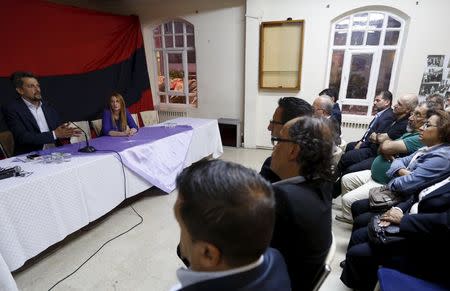Gay, Christian, Roma election candidates show Turkey's changing face
By Ayla Jean Yackley ESKISEHIR, Turkey (Reuters) - Activist Baris Sulu's battle to get same-sex marriage recognised stalled in Turkey's courts and LGBT groups he backed faced repeated legal harassment. Now he hopes to be the Muslim country's first openly gay lawmaker. Candidates from the lesbian, gay, bisexual and transgender community - along with Christians, Roma and members of dozens of other ethnicities and cultures - are running for parliament this weekend in large numbers for the first time. In a country that once viewed its diversity as a threat to national unity, the prominence of minorities in Sunday's general election is a sign that conservative mores are changing. "If you fight for your own rights, you will be crushed. But when minorities come together, we form a critical mass," said Sulu, 37, a candidate for the People's Democratic Party (HDP) in the university town of Eskisehir. "I may not win, but the most important thing is we're now talking about LGBT rights." Homosexuality is legal yet frowned upon in Turkey. While constitutionally secular, the country has been governed for more than 12 years by the AK Party which draws much of its support from conservative Muslims. Still, AKP governments have also acted to ease some pressure on ethnic and sexual minorities. The AKP and main opposition Republican People's Party (CHP) have candidates from minority groups. However, the most diverse list comes from Sulu's HDP, fourth-placed in opinion polls. Half of its nominees are women. The HDP derives its strength from Kurds, the largest minority which forms about 20 percent of the 76 million population. It has also nominated Aramaic-speaking Syriac Christians and two Yazidis, whose ancient religion draws on Zoroastrianism, Christianity and Islam, and whose numbers in Turkey have fallen to a few hundred after centuries of oppression. "We are the richest party when it comes to pluralism," said Selahattin Demirtas, who shares the HDP leadership with a woman. "The other parties have selected candidates from one or two different groups for decorative purposes." NEW LIBERALS Alevis, whose faith is a distinct branch of Islam with 15 million adherents, occupy top slots on various party lists. "The parties are reaching out to a new constituency that identifies with a liberal value structure," said Aaron Stein, an Atlantic Council fellow. Turkey was discarding the "ethnic nationalism used to carve out a new nation state in the 1920s". But the HDP's choice of unconventional candidates has drawn contempt from President Tayyip Erdogan, who has sharpened his rhetoric in recent weeks to rouse conservatives. Though not a candidate, Erdogan fears the HDP could endanger the majority enjoyed by the AKP, which he founded. He has railed against "atheists and Zoroastrians", "the Armenian lobby and gays" and parts of the Alevi community he accuses of being irreligious. Sulu is unworried. "Regardless of what the president says, I am a citizen pursuing my rights," he said. "As a gay man, even saying 'I exist,' is a political statement." Gays face job and healthcare discrimination, and Turkey has Europe's highest transgender murder rate, according to advocates. An anonymous pamphlet circulated in recent days showed Sulu’s image and read: "Do you want a homosexual from Eskisehir defending Kurds in parliament?" The LGBT community, like other groups now backing HDP, was galvanised by anti-government demonstrations in 2013 against what protesters said was Erdogan's growing authoritarianism. The HDP hopes to become the first party with overtly Kurdish origins in parliament. Since the Turkish Republic's founding in 1923, numerous Kurds have served in parliament and some presidents were part-Kurdish. But their ethnic identity was never at the forefront. SUNNI MUSLIM TURKS The HDP seeks to promote not just Kurds, but deputies from a multitude of backgrounds, including the Mhallami, who speak an ancient form of Arabic, and Pomaks, descended from Bulgarian. For decades, official policy denied the existence of Kurds and Alevis, and limited Christian and Jewish rights. Sunni Muslim Turks dominated business, politics, the army and the bureaucracy after the collapse of the heterogeneous Ottoman Empire in 1922. Erdogan came to power as prime minister in 2002 on an inclusive campaign and oversaw reforms to ease curbs on Kurdish cultural rights, return seized property to Christians and Jews and restore houses of worship. In recent years, prosecution of LGBT groups has halted. Despite Erdogan's tough talk, the AKP has slated an Armenian candidate. The Ottoman Armenian population was devastated during World War One in what most scholars say was genocide. About 60,000 Armenians remain, the bulk of a population of 100,000 Christians, along with 17,000 Jews despite sporadic violence. The HDP's Garo Paylan, 42, is one of at least five candidates hoping to become the first Armenian lawmaker after a half-century absence. "I was only an Armenian, imprisoned by my identity. Now I'm part of something bigger that wants a say in our future," said Paylan. The CHP, the country's oldest party, was long seen as the bastion of secular, elite Turks. This time, its slate is far more colourful, including an Armenian and a transgender woman. Ozcan Purcu, 38, is set to become the first Roma lawmaker after the CHP nominated him from its stronghold city of Izmir. Purcu grew up destitute in a tent and is one of a handful of Turkey's 3 million-strong Roma to finish university. "It would have been unimaginable for the CHP to have a Roma or LGBT candidate 10 years ago," Purcu said. "It marks a great change. With us in parliament, politics will never be the same." (Editing by Nick Tattersall and David Stamp)

 Yahoo News
Yahoo News 

